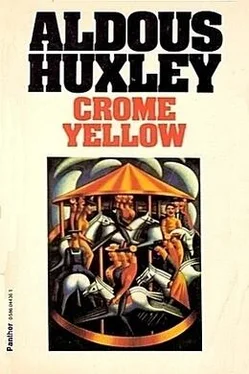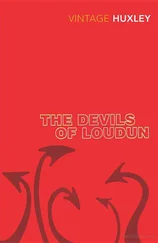"What have you done with the rest of your party?" she asked, looking up as Denis entered the room.
He explained. Anne had gone to bed, Ivor and Mary were still in the garden. He selected a book and a comfortable chair, and tried, as far as the disturbed state of his mind would permit him, to compose himself for an evening's reading. The lamplight was utterly serene; there was no movement save the stir of Priscilla among her papers. All silent and all damned, Denis repeated to himself, all silent and all damned…
It was nearly an hour later when Ivor and Mary made their appearance.
"We waited to see the moon rise," said Ivor.
"It was gibbous, you know," Mary explained, very technical and scientific.
"It was so beautiful down in the garden! The trees, the scent of the flowers, the stars…" Ivor waved his arms. "And when the moon came up, it was really too much. It made me burst into tears." He sat down at the piano and opened the lid.
"There were a great many meteorites," said Mary to anyone who would listen. "The earth must just be coming into the summer shower of them. In July and August…"
But Ivor had already begun to strike the keys. He played the garden, the stars, the scent of flowers, the rising moon. He even put in a nightingale that was not there. Mary looked on and listened with parted lips. The others pursued their occupations, without appearing to be seriously disturbed. On this very July day, exactly three hundred and fifty years ago, Sir Ferdinando had eaten seven dozen oysters. The discovery of this fact gave Henry Wimbush a peculiar pleasure. He had a natural piety which made him delight in the celebration of memorial feasts. The three hundred and fiftieth anniversary of the seven dozen oysters…He wished he had known before dinner; he would have ordered champagne.
On her way to bed Mary paid a call. The light was out in Anne's room, but she was not yet asleep.
"Why didn't you come down to the garden with us?" Mary asked.
"I fell down and twisted my ankle. Denis helped me home."
Mary was full of sympathy. Inwardly, too, she was relieved to find Anne's non–appearance so simply accounted for. She had been vaguely suspicious, down there in the garden—suspicious of what, she hardly knew; but there had seemed to be something a little louche in the way she had suddenly found herself alone with Ivor. Not that she minded, of course; far from it. But she didn't like the idea that perhaps she was the victim of a put–up job.
"I do hope you'll be better to–morrow," she said, and she commiserated with Anne on all she had missed—the garden, the stars, the scent of flowers, the meteorites through whose summer shower the earth was now passing, the rising moon and its gibbosity. And then they had had such interesting conversation. What about? About almost everything. Nature, art, science, poetry, the stars, spiritualism, the relations of the sexes, music, religion. Ivor, she thought, had an interesting mind.
The two young ladies parted affectionately.
The nearest Roman Catholic church was upwards of twenty miles away. Ivor, who was punctilious in his devotions, came down early to breakfast and had his car at the door, ready to start, by a quarter to ten. It was a smart, expensive–looking machine, enamelled a pure lemon yellow and upholstered in emerald green leather. There were two seats—three if you squeezed tightly enough—and their occupants were protected from wind, dust, and weather by a glazed sedan that rose, an elegant eighteenth–century hump, from the midst of the body of the car.
Mary had never been to a Roman Catholic service, thought it would be an interesting experience, and, when the car moved off through the great gates of the courtyard, she was occupying the spare seat in the sedan. The sea–lion horn roared, faintlier, faintlier, and they were gone.
In the parish church of Crome Mr. Bodiham preached on 1 Kings vi. 18: "And the cedar of the house within was carved with knops"—a sermon of immediately local interest. For the past two years the problem of the War Memorial had exercised the minds of all those in Crome who had enough leisure, or mental energy, or party spirit to think of such things. Henry Wimbush was all for a library—a library of local literature, stocked with county histories, old maps of the district, monographs on the local antiquities, dialect dictionaries, handbooks of the local geology and natural history. He liked to think of the villagers, inspired by such reading, making up parties of a Sunday afternoon to look for fossils and flint arrow–heads. The villagers themselves favoured the idea of a memorial reservoir and water supply. But the busiest and most articulate party followed Mr. Bodiham in demanding something religious in character—a second lich–gate, for example, a stained–glass window, a monument of marble, or, if possible, all three. So far, however, nothing had been done, partly because the memorial committee had never been able to agree, partly for the more cogent reason that too little money had been subscribed to carry out any of the proposed schemes. Every three or four months Mr. Bodiham preached a sermon on the subject. His last had been delivered in March; it was high time that his congregation had a fresh reminder.
"And the cedar of the house within was carved with knops."
Mr. Bodiham touched lightly on Solomon's temple. From thence he passed to temples and churches in general. What were the characteristics of these buildings dedicated to God? Obviously, the fact of their, from a human point of view, complete uselessness. They were unpractical buildings "carved with knops." Solomon might have built a library—indeed, what could be more to the taste of the world's wisest man? He might have dug a reservoir—what more useful in a parched city like Jerusalem? He did neither; he built a house all carved with knops, useless and unpractical. Why? Because he was dedicating the work to God. There had been much talk in Crome about the proposed War Memorial. A War Memorial was, in its very nature, a work dedicated to God. It was a token of thankfulness that the first stage in the culminating world–war had been crowned by the triumph of righteousness; it was at the same time a visibly embodied supplication that God might not long delay the Advent which alone could bring the final peace. A library, a reservoir? Mr. Bodiham scornfully and indignantly condemned the idea. These were works dedicated to man, not to God. As a War Memorial they were totally unsuitable. A lich–gate had been suggested. This was an object which answered perfectly to the definition of a War Memorial: a useless work dedicated to God and carved with knops. One lich–gate, it was true, already existed. But nothing would be easier than to make a second entrance into the churchyard; and a second entrance would need a second gate. Other suggestions had been made. Stained–glass windows, a monument of marble. Both these were admirable, especially the latter. It was high time that the War Memorial was erected. It might soon be too late. At any moment, like a thief in the night, God might come. Meanwhile a difficulty stood in the way. Funds were inadequate. All should subscribe according to their means. Those who had lost relations in the war might reasonably be expected to subscribe a sum equal to that which they would have had to pay in funeral expenses if the relative had died while at home. Further delay was disastrous. The War Memorial must be built at once. He appealed to the patriotism and the Christian sentiments of all his hearers.
Henry Wimbush walked home thinking of the books he would present to the War Memorial Library, if ever it came into existence. He took the path through the fields; it was pleasanter than the road. At the first stile a group of village boys, loutish young fellows all dressed in the hideous ill–fitting black which makes a funeral of every English Sunday and holiday, were assembled, drearily guffawing as they smoked their cigarettes. They made way for Henry Wimbush, touching their caps as he passed. He returned their salute; his bowler and face were one in their unruffled gravity.
Читать дальше











